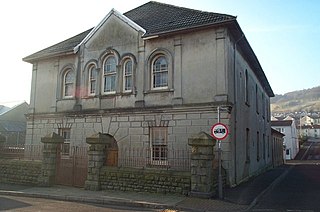
Salem, Robertstown is an Independent (Congregationalist) chapel in Bridge Street, Robertstown, Aberdare, Wales.

Salem, Robertstown is an Independent (Congregationalist) chapel in Bridge Street, Robertstown, Aberdare, Wales.
The history of Salem can be traced back to 1835, when Joseph Harrison, minister of Ebenezer, Trecynon broke away from that church because he was prepared to administer baptism by total immersion to those who wished. [1] This was contrary to the beliefs of Independent church members. Meetings were initially held in houses and later in the long room of the White Lion Inn. [1] Although this was disapproved of by a number of members who were teetotal it was far from unusual for the chapels of the valley to have their early origins in meetings in public houses.
This difficulty was initially addressed by building a wooden hut in 1836 which was known as Ty Planca. [1] Soon it became too small and the congregation proceed to build Salem in 1841, at a cost of £550, and on land leased from Dr James Lewis Roberts. Joseph Harrison was minister until his death in 1851.
Harrison was succeeded by Joshua Thomas. [2] He served as minister for many years and was presented with a testimonial of £140 in April 1875. The gift was presented by John Harrison, the oldest deacon and son of the founder of the chapel. [3] Speakers on this occasion included Michael D. Jones of Bala, Thomas Rees of Swansea and local ministers William Edwards of Ebenezer, Trecynon and William Williams of Nebo, Hirwaun. [3]
During this period members from Salem established Bethel, Gadlys.
Membership reached 65 in 1841 but by the following year had fallen to 25.
Salem remained open until the twenty-first century.

Aberdare is a town in the Cynon Valley area of Rhondda Cynon Taf, Wales, at the confluence of the Rivers Dare (Dâr) and Cynon. Aberdare has a population of 14,462. Aberdare is 4 miles (6 km) south-west of Merthyr Tydfil, 20 miles (32 km) north-west of Cardiff and 22 miles (35 km) east-north-east of Swansea. During the 19th century it became a thriving industrial settlement, which was also notable for the vitality of its cultural life and as an important publishing centre.

Trecynon is a village near Aberdare situated in the Cynon Valley, in Rhondda Cynon Taf, Wales. It dates from the early nineteenth century and its developed as a result of the opening of the Aberdare Ironworks at Llwydcoed in 1800.

Siloa, Aberdare was the largest of the Welsh Independent, or Congregationalist, chapels in Aberdare. Services are held in the Welsh language. Established in 1844, Siloa is one of the few Welsh language chapels in the locality to remain open today. Siloa was notable for its long-serving ministers and in over a century there were only three pastorates, namely those of David Price (1843–78), D. Silyn Evans (1880–1930) and R. Ifor Parry (1933–64).
Heolyfelin Chapel, Trecynon, Aberdare was a Welsh Baptist chapel established in 1855. Services were held in the Welsh language. The building seated 800. By December 2015 the chapel had closed and was for sale.
Gwawr, Aberaman was a Baptist chapel in Regent Street, Aberaman, near Aberdare, South Wales, formed as a branch of Calfaria, Aberdare
Seion, Cwmaman is a Welsh Baptist church, originally established in 1859. The chapel closed in 2013 but the church still meets at another location in the village.

Saron, Aberaman was a Welsh Independent (Congregationalist) chapel in Davies Street, Aberaman, formed as an initiative of the David Price of Siloa, Aberdare, soon after the development of Aberaman as an industrial settlement as a result of the activities of Crawshay Bailey and David Davis, Blaengwawr. Saron was claimed to be the largest chapel in the Cynon Valley although Calvaria, Abercynon, Ebenezer, Trecynon and Siloa, Aberdare all had a similar capacity.
Ebenezer, Trecynon is an Independent (Congregationalist) chapel in Ebenezer Street, Trecynon, Aberdare, Wales. It was one of the earliest Independent chapels in the Cynon Valley and remained an active place of worship until 2009.
Horeb, Llwydcoed is an Independent (Congregationalist) chapel in Llwydcoed, Aberdare, Wales.

Nebo, Hirwaun was an Independent (Congregationalist) chapel in Merthyr Road, Hirwaun, Aberdare, Wales.

Elim, Cwmdare was an Independent (Congregationalist) chapel in Cwmdare, Aberdare, Wales.
Bethel, Gadlys was an Independent (Congregationalist) chapel in Railway Street, Gadlys, Aberdare, Wales.

Ramoth, Hirwaun originally a Baptist chapel in Davies Row, Hirwaun, Aberdare, Wales. Services at Ramoth were held in the Welsh language. Following renovation in 1982, the building continues to be used for Christian worship as an Assemblies of God fellowship.
Moriah Aman, Cwmaman was a Welsh Independent (Congregationalist) chapel in Fforchaman Road, Cwmaman, Rhondda Cynon Taf, Wales.
Soar, Cwmaman was a Welsh Calvinistic Methodist chapel in Fforchaman Road, Cwmaman, Rhondda Cynon Taf, Wales.
Siloh, Trecynon was an Independent (Congregationalist) chapel in Mount Pleasant, Trecynon, Aberdare, Wales.

Bethesda, Abercwmboi is a Welsh Baptist church in Abercwmboi near Aberdare. Services continue to be held in the Welsh language.

Hen-Dy-Cwrdd is a disused Unitarian chapel in Trecynon, Aberdare, Wales. Services at the chapel were conducted in the Welsh language.
Ynysgau Chapel was one of the earliest chapels in Merthyr Tydfil. The cause dated back to 1749 and services were held in the Welsh language. The chapel was demolished in 1967 as part of the Merthyr Town Improvement Scheme.
Bethesda, Merthyr Tydfil was one of the earliest chapels in the Welsh industrial town of Merthyr Tydfil. Services were held in the Welsh language.